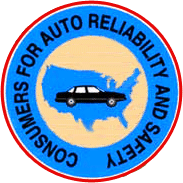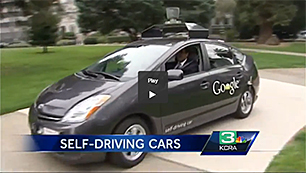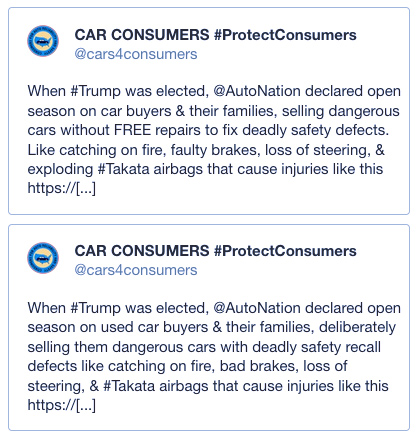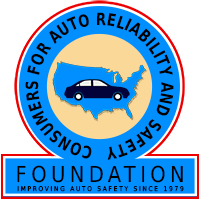Blasting Wells Fargo at Hearing before California Senate Banking Committee
At the invitation of the California Senate Banking Committee, CARS President Rosemary Shahan testified regarding Wells Fargo's illegal practices, including:
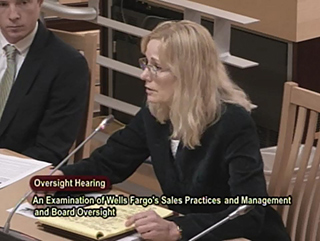
CARS President testifies before California Senate Banking Committee, blasting Wells Fargo over its illegal practices
- Manipulating overdraft fees to maximize the penalties paid by consumers with Wells Fargo accounts
- Creating millions of fraudulent accounts through identity theft, forgery, or other types of illegal activities, costing victims millions in added fees, harmed credit, and other charges
- Forcing victims to surrender their Constitutional rights to haul Wells Fargo before a court of law and hold Wells Fargo accountable for its illegal activity, as a condition of obtaining products or services
- Illegally repossessing vehicles from active duty military personnel and their families, in violation of the Servicemembers Civil Relief Act. This could cost highly trained and desperately needed members of the Armed Forces their security clearances, and jeopardize our national security.
Read more:
Los Angeles Times: Even in fraud cases, Wells Fargo customers are locked into arbitration
Los Angeles Times: Wells Fargo customers harmed by fake accounts would get to sue under proposed legislation
Los Angeles Times: [U.S.] Supreme Court upholds verdict against Wells Fargo over overdraft fees in California
Los Angeles Times: Wells Fargo to pay $24.1 million for improper repossession of Servicemembers' cars
US Department of Justice: Service Members to Receive Over $123 Million for Unlawful Foreclosures Under the Servicemembers Civil Relief Act
Battling against forced arbitration and the "Rip-off clause"
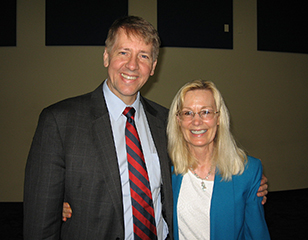
Richard Cordray, Director of the Consumer Financial Protection Bureau, and CARS President Rosemary Shahan, a fellow Buckeye
Among the points CARS and the CARS Foundation made:
"Consumers deserve at least the same freedom, protection, and access to justice as car dealers,
who were granted a special exemption from the Federal Arbitration Act by Congress. We agree with the
points and arguments that Senator Orrin Hatch (R-UT) and Senator Charles Grassley (R-IA) made in
favor of restoring Seventh Amendment rights to car dealers, which clearly should apply equally to
consumers.
As Senator Hatch stated when he introduced S. 1140, 'The Motor Vehicle Franchise Contract Arbitration Fairness Act of 2001,' the new law was needed to protect auto dealers from having mandatory arbitration clauses imposed upon them by auto manufacturers, due to their "unequal bargaining power."
As Senator Hatch stated when he introduced S. 1140, 'The Motor Vehicle Franchise Contract Arbitration Fairness Act of 2001,' the new law was needed to protect auto dealers from having mandatory arbitration clauses imposed upon them by auto manufacturers, due to their "unequal bargaining power."
Also, as Senator Grassley [Republican, Iowa] speaking in support of S. 1140, stated:
"While arbitration serves an important function as an efficient alternative to court, some tradeoffs
must be considered by both parties, such as limited judicial review and less formal
procedures regarding discovery and rules of evidence. When mandatory binding arbitration is
forced upon a party, for example when it is placed in a boiler-plate agreement, it deprives the
weaker party the opportunity to elect another forum. As a proponent of arbitration I believe it is
critical to ensure that the selection of arbitration is voluntary and fair…Unequal bargaining
power exists in contracts between automobile and truck dealers and their manufacturers. The
manufacturer drafts the contract and presents it to dealers with no opportunity to negotiate…
The purpose of arbitration is to reduce costly, time-consuming litigation, not to force a party to
an adhesion contract to waive access to judicial or administrative forums for the pursuit of
rights under State law."
Senator Grassley further stated that:
"This legislation will go a long way toward ensuring that parties will not be forced into binding
arbitration and thereby lose important statutory rights. I am confident that given its many
advantages arbitration will often be elected. But it is essential for public policy reasons and
basic fairness that both parties to this type of contract have the freedom to make their own
decisions based on the circumstances of the case."
The exact same points clearly apply regarding consumer contracts, including contracts with auto dealers and lenders."
Read more: Comments filed by CARS and the CARS Foundation
CARS tells Toyota: Stop selling unsafe lemons to military families

Toyota sold John and Christina Snell a new unsafe lemon RAV 4
"In 2013, a Toyota car dealership in Georgia sold my Army husband and me a new Toyota RAV 4. About a year later, it began breaking down at unpredictable moments, leaving me stranded on winding country roads in the middle of winter in Germany, where we were stationed. At first, Toyota refused to repair our vehicle unless we paid for the parts and labor out of pocket in advance. Even after we persisted, Toyota failed to provide the necessary parts, leaving us without a vehicle for months. Eventually, a panel of arbitrators ruled that our RAV 4 was unsafe and declared it a lemon. Toyota was ordered to take back our vehicle and replace it, but they refused. Instead, now they are suing us."
Act Now: Help send a message to Toyota: stop selling unsafe lemon cars to military families
CARS Praises Consumer Financial Protection Bureau for
Helping Improve the Economy and Protect Consumers,
Especially Military Servicemembers and their Families
Helping Improve the Economy and Protect Consumers,
Especially Military Servicemembers and their Families

Richard Cordray, Director of the Consumer Financial Protection Bureau, and CARS President Rosemary Shahan, a fellow Buckeye
The dealers typically also charge exorbitant interest rates on loans that vastly exceed the value of the cars. When the cars break down, the car buyers lose their only means of transportation to get to work, costing them their jobs. When they default on their loans, the dealers repossess the cars, and then resell them again and again. Each time, they make a high profit.
As reported in an award-winning series by Los Angeles Times reporter Ken Bensinger, some dealers make this predatory practice, known as "churning," a regular business practice. Too often, California's Department of Motor Vehicles fails to protect car buyers from such practices. Even if dealers are closed by the DMV, or declare bankruptcy, they often re-open again, sometimes in the exact same location, under a relative's name, and continue to engage in the same illegal conduct.
CARS succeeds in halting anti-consumer legislation
That would have weakened protections
against auto sales and lending fraud
That would have weakened protections
against auto sales and lending fraud

The bill, AB 1743, was authored by Assemblymember Dababneh, the Chair of the California Assembly Banking Committee. While the the car dealers association and the author claimed it was a "consumer protection" measure, it would have provided no benefits to car buyers, while tilting the law in favor of unscrupulous dealers who engage in illegal, deceptive practices such as "loan packing," switching car buyers from purchases to leases, forgery, or other forms of financial fraud that can add thousands onto the price of buying a car.
The bill passed almost unanimously out of the California Assembly, which is increasingly dominated by anti-consumer Republicans and Democrats who won election thanks largely to campaign contributions from Big Business. However, faced with growing opposition, the author withdrew the bill before it was voted upon in the Senate Judiciary Committee.
Read more: CARS opposes car dealer bill AB 1743 (Dababneh);
and More Consumer groups oppose car dealer bill
Federal legislation spearheaded by CARS
to improve protection against unsafe recalled cars
takes effect
to improve protection against unsafe recalled cars
takes effect

NEWS: For Immediate Release: Wednesday, June 1, 2016
Contact: Rosemary Shahan, President, Consumers for Auto Reliability and Safety, 530-759-9440
Contact: Rosemary Shahan, President, Consumers for Auto Reliability and Safety, 530-759-9440
New Federal Safety Recall Law Takes Effect
As the nation's travel season heats up, motorists and their families now have a new level of protection from unsafe, recalled cars. Today, the Raechel and Jacqueline Houck Safe Rental Car Act takes effect. The Act, named for two sisters, ages 24 and 20, who were killed by a recalled rental car, makes it a violation of federal law for rental car companies with fleets of 35 or more rental or loaner cars (including some car dealers), to rent, loan, or sell defective, unsafe recalled cars until the safety defects have been repaired.
The new law is the first major expansion of the National Highway Traffic Safety Administration's authority over safety recalls since the agency was created in the 1960's. For the first time, NHTSA will be able to crack down on covered rental car companies and car dealers, and issue fines or invoke other sanctions, to help prevent tragedies like the crash that claimed Raechel and Jacqueline's lives.
“I'm thrilled that the Safe Rental Car Act named for my beautiful, treasured daughters, Raechel and Jacqueline, is now the law of the land. But I'm worried about the loaner car loophole for car dealers and remain committed to closing that dangerous safety gap,” said Cally Houck, Mother of Raechel and Jacqueline. The Houcks filed a lawsuit against the rental car company under state laws against negligence and wrongful death, and won a unanimous jury verdict.
“If this law was in existence when my cherished, beautiful daughter Jewel rented a car, she would still be alive today,” said Alexander Brangman. In 2014, his 26-year- old daughter Jewel died while driving a rented 2001 Honda Civic. Tragically, the recalled car had an unrepaired and defective Takata airbag, which exploded in her face during a low speed chain reaction fender bender. Passengers in the other vehicles were able to walk away from the crash site without injuries. However in Jewel’s case, the shrapnel from the defective airbag sliced an artery in her neck, causing her to bleed to death. The small rental car company in San Diego, CA that rented the Honda to Jewel had approximately 55 vehicles for rent, and would be covered under the new Act.
U.S. Senator Chuck Schumer (D-NY), the principal author of the Act, said, “This law is going to save lives, period. Families heading out for vacation or businesspeople on travel should never have to wonder if their rental car is under recall when they drive it off the lot. Thanks to this bill, the millions of people who rent cars every year will have peace of mind that rental car companies can't rent or sell cars that they know are unsafe.”
“I am so proud that the Raechel and Jacqueline Houck Safe Rental Car Act takes effect today so that the public can be assured when they rent a car, it cannot be under recall,” said U.S. Senator Barbara Boxer (D-CA), a leading champion for the Act. “It is outrageous that some loaner vehicles were exempted from the law and we must act to close this dangerous loophole.”
“When consumers and families drive a rental car off the lot, they should be able to do so with the confidence that car is safe to drive, and our legislation will help achieve that peace of mind,” said Senator Claire McCaskill, former Chairman of the Senate Subcommittee on Consumer Protection. “Companies like Honda and GM, as well as the rental car industry and consumer and safety advocates rallied support for our commonsense plan that will help ensure any rental cars subject to recall are grounded, and that companies violating that law are held accountable.”
“Implementation of the Raechel and Jacqueline Houck Safe Rental Car Act is an important consumer safety measure that is long overdue,” Rep. Lois Capps said. “If a car is deemed too dangerous to sell, it is too dangerous to rent — it’s that simple. Thanks to the tireless efforts of advocates like Cally Houck, we have now made our roads safer. This commonsense, bipartisan law will undoubtedly protect public safety and prevent more unspeakable tragedies from occurring.”
“The Safe Rental Car Act will save lives and assure Americans that the vehicles they rent are free of known defects,” said Rep. Jan Schakowsky. “Rental car companies should never rent out cars that are unsafe. Sadly, for far too many families these vital protections come too late. But thanks to the hard work of family members who channeled their grief and anger into advocacy, we now have a law to prevent future deaths. We must continue to work to ensure that every vehicle bought or rented is safe.”
Rental car companies are the largest purchasers of new cars in North America. They are also among the largest sellers of used cars. So under the new federal law, millions of used cars will also be required to be repaired, in addition to existing state laws that prohibit dealers from selling unsafe products to the public.
However, thanks to a last-minute loophole added by the Republican House of Representatives at the behest of auto dealers, and carried by Rep. Roger Williams (R), a Texas car dealer, the Act applies only to companies with a fleet of 35 or more rental or loaner vehicles, on average – exempting many auto dealers. If a dealer who is not covered by the new law rents, loans, or sells an unsafe recalled car, it would still be a violation of various state laws, such as laws against false advertising, unfair and deceptive acts and practices, or violations of express or implied warranties, or – if someone is injured or killed as a result -- negligence or wrongful death, but NHTSA is not able to enforce those laws.
The leading Congressional champions for passage of the Act were U.S. Senators Schumer, Boxer, McCaskill, Nelson, and Blumenthal, and Representatives Capps, Schakowsky, Butterfield, and Jones. The Senate measure was also co-sponsored by Senators Casey, Feinstein, and Gillibrand. U.S Secretary of Transportation Anthony Foxx and NHTSA Administrator Mark Rosekind, M.D. also advocated strongly for its passage. The DOT's request to Congress, for enactment of the FAST Act, included provisions calling for NHTSA to have authority to curb rental car companies and car dealers' illegal sales of ALL recalled rentals / loaners or used cars.
In a commendable move, the rental car industry, including Enterprise, Hertz, Avis, Dollar- thrifty, Alamo, National, and the American Car Rental Association, as well as many smaller rental car companies, helped persuade lawmakers to vote for the Act, and worked alongside Cally Houck, Consumers for Auto Reliability and Safety, and other supporters for passage of the new law. General Motors and Honda broke ranks with other auto manufacturers and also supported the bill.
The Senate and House both rejected attempts by some auto manufacturers and by the National Automobile Dealers Association to kill the bill, or to legalize rentals and loaners of recalled vehicles with “disclosure” -- shifting liability onto the victims of unsafe vehicles.
In contrast to the position of the Department of Transportation and National Highway Traffic Safety Administration that recalled cars should not be rented or sold to consumers, unless the safety defects have been repaired, the Federal Trade Commission is on the brink of approving settlements with General Motors and the Lithia and Koons auto dealership chains that would allow them to advertise that defective recalled cars are “safe,” have “been repaired for safety,” or have passed a “rigorous inspection” and qualified to sold as “certified” cars without repairing the safety recalls, if they merely disclose that the “certified” used vehicles may be subject to a safety recall.
Consumers for Auto Reliability and Safety, many other consumer groups, and Cally Houck are actively opposing the FTC's proposed consent agreements, which would undermine existing state consumer protection laws. If they are finalized, the consent agreements would be in effect for 20 years. Meanwhile, they could be used by unscrupulous auto dealers in litigation, against victims injured or killed by recalled cars, and as grounds to oppose any further improvements in federal law.
__________________
CARS Participates in Forum on Autonomous Vehicles
Convened by the National Highway Traffic Safety Administration
Convened by the National Highway Traffic Safety Administration
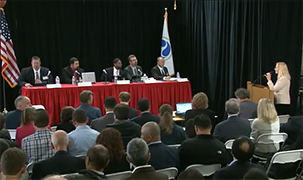
CARS President Rosemary Shahan cautions against allowing autonomous vehicles on America's roads prematurely, before they are really safe.
At this meeting, NHTSA seeks input on planned operational guidelines for the safe deployment of automated vehicles (AV). Of high importance to the agency is information on the roadway scenarios and operational environments that highly automated vehicles will need to address, and the associated design and evaluation processes and methods needed to ensure that AV systems are able to detect and appropriately react to these scenarios"
Advocating against discriminatory auto lending that costs
Car buyers billions of extra charges in hidden fees
Car buyers billions of extra charges in hidden fees
CARS is actively working with a large coalition of consumer and labor organizations to oppose attempts by Congress to bar the Consumer Financial Protection Bureau from enforcing laws that prohibit discriminatory auto lending that costs car buyers billions in extra hidden fees.
The extra charges are not based on creditworthiness, but on how much the dealer and lender can extract in added profits. The extra charges have been repeatedly found to be discriminatory, costing African American and Latino car buyers more, even when they have the same credit as White car buyers. According to the Center for Responsible Lending, the added charges cost car buyers over 25.8 billion extra, over the life of their auto loans.
In 2005, CARS spearheaded successful efforts in California to cap the amount dealers can charge in "markups" -- hidden extra fees that increase the amount of interest consumers pay for auto loans. As a result of CARS' advocacy, California is the only state that caps dealer markups. The caps are 2.5% for loans up to 60 months, and 2% for longer loans.
Now Congress is threatening to reverse the progress that the Consumer Financial Protection Bureau is making in enforcing laws against discriminatory auto lending. As the New York Times recently stated in a strongly pro-consumer editorial:
"In 2013, the Consumer Financial Protection Bureau issued legal guidance spelling out lenders’ obligations under federal lending law and then began enforcing the law’s anti-bias provisions. Enforcement has led to restitution totaling $126 million from Ally Bank (formerly GMAC), Honda Financial and Toyota Motor Credit; hundreds of thousands of black, Hispanic and Asian borrowers will benefit. It also has led Honda and Toyota to cap dealer interest-rate markups. Some auto lenders have banned markups and now pay dealers a flat fee. In addition, several anti-discrimination enforcement actions against auto lenders are pending at the bureau."
Read more: New York Times: When auto dealers profit from bias
The extra charges are not based on creditworthiness, but on how much the dealer and lender can extract in added profits. The extra charges have been repeatedly found to be discriminatory, costing African American and Latino car buyers more, even when they have the same credit as White car buyers. According to the Center for Responsible Lending, the added charges cost car buyers over 25.8 billion extra, over the life of their auto loans.
In 2005, CARS spearheaded successful efforts in California to cap the amount dealers can charge in "markups" -- hidden extra fees that increase the amount of interest consumers pay for auto loans. As a result of CARS' advocacy, California is the only state that caps dealer markups. The caps are 2.5% for loans up to 60 months, and 2% for longer loans.
Now Congress is threatening to reverse the progress that the Consumer Financial Protection Bureau is making in enforcing laws against discriminatory auto lending. As the New York Times recently stated in a strongly pro-consumer editorial:
"In 2013, the Consumer Financial Protection Bureau issued legal guidance spelling out lenders’ obligations under federal lending law and then began enforcing the law’s anti-bias provisions. Enforcement has led to restitution totaling $126 million from Ally Bank (formerly GMAC), Honda Financial and Toyota Motor Credit; hundreds of thousands of black, Hispanic and Asian borrowers will benefit. It also has led Honda and Toyota to cap dealer interest-rate markups. Some auto lenders have banned markups and now pay dealers a flat fee. In addition, several anti-discrimination enforcement actions against auto lenders are pending at the bureau."
Read more: New York Times: When auto dealers profit from bias
Consumer groups oppose attempts to bar CFPB from
enforcing laws against discriminatory auto lending
Read the letter to the U.S. Senateenforcing laws against discriminatory auto lending
Participating in Autonomous Vehicle Workshop to provide
pro-safety perspective
pro-safety perspective
"Google urges DMV to change rules on driverless cars"
"SACRAMENTO, Calif. —Google may be leading the way on driverless cars, but the company is threatening to pull the cars out of the California market if DMV requires a human operator behind the wheel....
KCRA - TV
January 28, 2016
by Mike Luery
by Mike Luery
Many consumer groups are skeptical of driverless cars.
'The DMV is wise and smart to require that a driver be behind the wheel, because if you look at what's been happening, there's been thousands of times when the drivers had to take control of the cars to prevent a crash,' said Rosemary Shahan, president of Consumers for Auto Reliability and Safety."
Watch full report: KCRA-TV: Google urges DMV to change rules on driverless cars
Helping educate the public about how to get lemon-aid
for defective lemon cars
for defective lemon cars
"Lemon Aid: What you need to know about state lemon laws"
Lemon laws only apply to vehicles still covered by the manufacturer’s original warranty, although you may be able to make a claim later as long as you have documentation the problem began before the warranty expired. So hang on to those receipts from every visit to your dealer or mechanic. And get a record of every visit, whether the wrenches come out or not.
Car and Driver Magazine
January 22, 2016
by Jim Travers
by Jim Travers

The reason for hiring an attorney is simple. Carmakers have a whole lot more legal firepower than you do, and their lawyers have been to this rodeo before.
“People should seek legal advice,” says Rosemary Shahan, president of Consumers for Auto Reliability and Safety. Shahan knows a thing or two about lemon law. She and her non-profit advocacy group initiated California’s lemon law, which became a model for other states nationwide.
It’s also critical to pick the right attorney. A quick Google search will bring up pages of lemon law attorneys, some of whom have the look of virtual ambulance chasers.
“Go to the website for the National Association for Consumer Advocates,” said Shahan. “Those are the guys. The manufacturers know who the good ones are. A lot of the time, that’s all it takes.”
Read more: Car and Driver, Lemon Aid: "What you need to know about state lemon laws"
